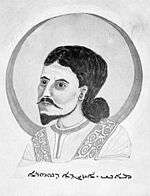Psalms of Thomas
The Psalms of Thomas (more correctly Psalms of Thom) are a set of 2nd century Judeo-Christian psalms[1] found appended to the end of a Coptic Manichaean psalm book, which was in turn part of the Medinet Madi Coptic Texts uncovered in 1928. Published in 1938 by C. R. C. Allberry,[2] Internet versions only comprise 12 numbered psalms.
The themes and content of the psalms bear a considerable resemblance to the Hymn of the Pearl from the Acts of Thomas. In 1949 Torgny Save-Soderbergh suggested that the psalms were largely based upon canonical Mandaean texts (despite Jesus being mentioned positively in two psalms), his work on the psalms demonstrating that Mandaeism did not derive from Manichaeism, as was formerly commonly believed.[3]
Nevertheless, considerable controversy continues as to whether the Thomas or Thom referred to could be the Apostle Thomas, Mani's disciple, also called Thomas, or the Gnostic concept of the divine twin. This is because the latter is referred to in other parts of the Coptic Manichaean Psalm-book as a distinct person from the Apostle. The enigma has since deepened with the publication of the Cologne Mani Codex in the 1970s, which showed that Mani himself came out of a baptizing Christian sect called the Elkasaites (= Elcesaites).
References
- The Christian Centuries: A New History of the Catholic Church. The Christian Centuries: A New History of the Catholic Church. McGraw-Hill. 1964. p. 47. Retrieved 5 July 2018.
- Allberry, C. R. C., editor & translator, with a contribution by Hugo Ibscher, Coptic Manichaean Psalm-book part II, W. Kohlhammer, Stuttgart, 1938. The Psalms of Thomas occupy pages 203-227.
- Save-Soderbergh, Torgny, Studies in the Coptic Manichaean Psalm-book, 1949.
